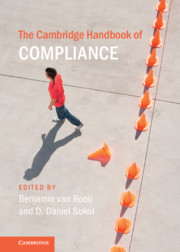Book contents
- The Cambridge Handbook of Compliance
- The Cambridge Handbook of Compliance
- Copyright page
- Contents
- Figures
- Tables
- Contributors
- 1 Introduction: Compliance as the Interaction between Rules and Behavior
- Part I Compliance Concepts and Approaches
- Part II Deterrence and Incapacitation
- Part III Incentives
- Part IV Legitimacy and Social Norms
- Part V Capacity and Opportunity
- Part VI Compliance and Cognition
- Part VII Management and Organizational Processes
- Part VIII Measuring and Evaluating Compliance
- 48 Laboratory Experiments
- 49 Compliance Experiments in the Field: Features, Limitations, and Examples
- 50 Naming and Shaming: Evidence from Event Studies
- 51 Validity Concerns about Self-Reported Surveys on Rule Compliance
- 52 Factorial Surveys and Crime Vignettes
- 53 Qualitative Methods and the Compliance Imagination
- 54 Policy Evaluation
- Part IX Analysis of Particular Fields
- References
48 - Laboratory Experiments
from Part VIII - Measuring and Evaluating Compliance
Published online by Cambridge University Press: 07 May 2021
- The Cambridge Handbook of Compliance
- The Cambridge Handbook of Compliance
- Copyright page
- Contents
- Figures
- Tables
- Contributors
- 1 Introduction: Compliance as the Interaction between Rules and Behavior
- Part I Compliance Concepts and Approaches
- Part II Deterrence and Incapacitation
- Part III Incentives
- Part IV Legitimacy and Social Norms
- Part V Capacity and Opportunity
- Part VI Compliance and Cognition
- Part VII Management and Organizational Processes
- Part VIII Measuring and Evaluating Compliance
- 48 Laboratory Experiments
- 49 Compliance Experiments in the Field: Features, Limitations, and Examples
- 50 Naming and Shaming: Evidence from Event Studies
- 51 Validity Concerns about Self-Reported Surveys on Rule Compliance
- 52 Factorial Surveys and Crime Vignettes
- 53 Qualitative Methods and the Compliance Imagination
- 54 Policy Evaluation
- Part IX Analysis of Particular Fields
- References
Summary
Abstract: In this chapter, we assess the use of laboratory experiments in tax compliance research. We first discuss the reasons for using laboratory experiments, and we then describe the basic design of most experiments, including their main limitations. We also summarize some of the main results of these studies, and we discuss how the insights obtained from experimental research can help shape better tax policies. We conclude with some suggestions on new areas of research on tax compliance in which laboratory experiments may be usefully applied in the future.
- Type
- Chapter
- Information
- The Cambridge Handbook of Compliance , pp. 707 - 727Publisher: Cambridge University PressPrint publication year: 2021
References
- 1
- Cited by

